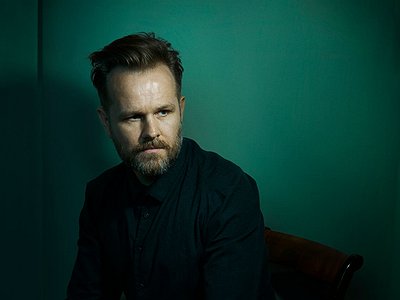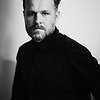Part 1
Name: Valgeir Sigurðsson
Nationality: Icelandic
Occupation: Composer
/ Founder of The Bedroom Community
Current project: The County
Recommendations: Finnbogi Pétursson is an Icelandic artist whose work I wish for everyone to experience, ideally through one of his site-specific installations. His work RIÐ/HZ 2019 uses sound waves to ‘paint’ in water and is currently on at the Reykjavík Art Museum / The Master and Margarita by Mikhail Bulgakov. I’m currently scoring a theatre adaptation of this brilliant book so I’m reminded how relevant it is still today.
Website/Contact: Valgeir has an excellent website that showcases his work, news and tour dates at valgeir.net
When did you start composing film music - and what or who were your early passions and influences? What what is about music and/or sound that drew you to it?
Since I started writing music I always thought that making music for films would be something I’d enjoy. I didn’t necessarily set out to be a film composer, just a “music maker” and I’m still figuring out what that means. Early on a few friends had asked me to make music for their short films, or TV programs but I scored my first feature film in 2002, it was actually a series of five shorts rolled up into one feature, each short had a different writer/director. It turned out to be a valuable exercise in scoring, dealing with all these different visions in one go, and it came hot on the heels of a long period working as a programmer and engineer for the score of Dancer in the Dark, which in many ways was a formative music-making experience for me.
I recall a very powerful experience of how the relationship between music and images can function when I watched Koyaanisqatsi in the cinema for the first time as a teenager. I’m a fan of Bernard Herrmann’s scores, and to me a lot of Ennio Morricone's work still stands up as some of the most adventurous film music ever made. But I got into film music as my interest in avant-garde and classical music started to grow, with 2001 and A Clockwork Orange being benchmarks, as well as some of Peter Greenaway’s films, and also Derek Jarman’s films.
For most artists, originality is first preceded by a phase of learning and, often, emulating others. What was this like for you? How would you describe your own development as an artist and the transition towards your own voice? What is the the relationship between copying, learning and your own creativity?
I feel that I’m constantly learning through music and that’s a big part of what keeps me interested and keeps me excited. Perhaps it comes with having received very little formal training. The joy is in the discovery and in pushing forward on some personal scale that cannot be defined or measured. I enjoy that constant search.
What were your main compositional challenges when starting out as a film composer and how have they changed over time?
I don’t think that I was particularly subtle in my approach to begin with, but I’ve learned that less can be more and to better control all the nuances that the medium has to offer. I question my work all the time though, that’s my biggest challenge whatever the project might be. But I’ve always jumped head first into any new challenge that seemed worth taking on. Film music, and music in general, has been that way for me. I keep discovering new possibilities, and as long as I feel that I can develop my skills with every new project it is a challenge worth taking on.
What, to you, are the main functions and goals of soundtracks and film music and how would you rate their importance for the movie as a whole? How do you maintain a balance between, on the one hand, artistic integrity and sticking to your creative convictions and, on the other, meeting the expectations of the director?
In film as well as in theatre, I’ve been lucky to be working with directors and producers that I share a vision with, and that have wanted me in the creative team as an equal partner. Music is as crucial as any other component of the movie. What separates it often from the other departments is that it is the last element to get completed. For better or for worse. When I’m working on any commission, for a film, TV, game, or any medium where music is supporting a narrative or a picture, I feel that I should be there to serve the overall piece. I think about film scoring as creating the emotional map of the movie. Most people would agree that if you remove the sound and the music, you’ve removed much of the map of that film. The other side to it is that scoring is a situation for me to compose and collaborate with other musicians and artists. And with that in mind, I usually just go ahead and write the music that resonates with my own instincts, and serves the pictures. In The County, for example, I wrote and recorded a ton more score than we actually ended up using in the final sound mix. But that material all served a purpose for me, so it’s integral to the music even though it’s not even heard in the film version. And that’s where the soundtrack album is important to me too, it’s a piece in itself, as opposed to being a carbon copy of the movie’s audio track. There are layers of wonderful strings for example, that informed the viewer much too explicitly how to feel while watching that film. But as a musical statement these elements are vital when you listen out of context of the other storytelling elements.
What was your first studio like? How and for what reasons has your set-up evolved over the years and what are currently some of the most important pieces of gear for you?
Not counting my bedroom as I was starting to collect synths, effect pedals and drum machines as a young boy; it was a pile of very functional equipment that I bought and had in a downtown Reykjavík basement. It’s evolved in a way that I have gone to extremes in analog consoles and outboard gear, and I feel like I’m in a process of reducing it to the essentials at the moment. I only want to have things around that I use. I used to be a bit of a hoarder or a collector, but lately I feel like too much stuff just gets in the way.
How do you make use of technology? In terms of the feedback mechanism between technology and creativity, what do humans excel at, what do machines excel at?
I’ve always had a bit of a love / hate relationship with technology but I make music the way that I do because of technology and the way I have grown up with these modern day tools. Right now, I just want it to be functional and not get in my way. I’d probably be a much better instrumentalist if it wasn't for the technology, I just spend so much more time at the computer keyboard than I do at the musical keyboard. But other humans excel at playing instruments.
Production tools, from instruments to complex software environments, contribute to the compositional process. How does this manifest itself in your work? Can you describe the co-authorship between yourself and your tools?
The first time spent with a new instrument or software is something I always try to capture because I feel that is the moment where the unfamiliarity can lead to some unexpected results. So I make a point of being set up to record any time that I’m in that situation. But I also work in a big room with natural light, which probably makes staring at a computer screen for hours on end a lot less exhausting than if I were holed up somewhere in a dark room. And I think that my room is as important a production tool for me as much of the equipment that I have. It’s a very ‘human’ space. It’s where I like to invite collaborators and I feel that the place inspires others as well. I try to approach every other tool with an idea first.
Collaborations can take on many forms. What role do they play in your approach and what are your preferred ways of engaging with other creatives through, for example, file sharing, jamming or just talking about ideas?
I’m fortunate enough to collaborate with some very inspiring musicians on a regular basis. I want to go into a situation with a clear idea of what I’m trying to achieve, but within that I really enjoy harvesting material from collaborators that I then spend hours and days sculpting into finished form. File sharing is useful, but I don’t feel that anything replaces the creative energy of being in the room with someone.






